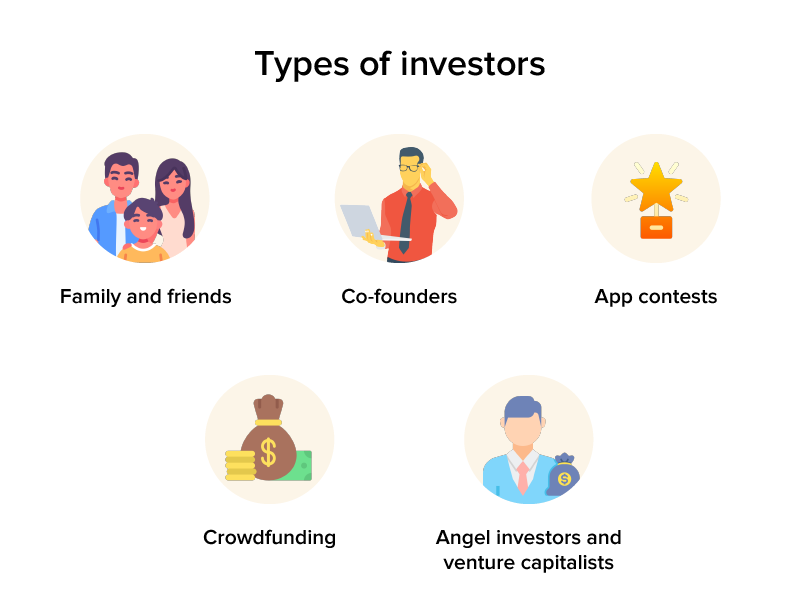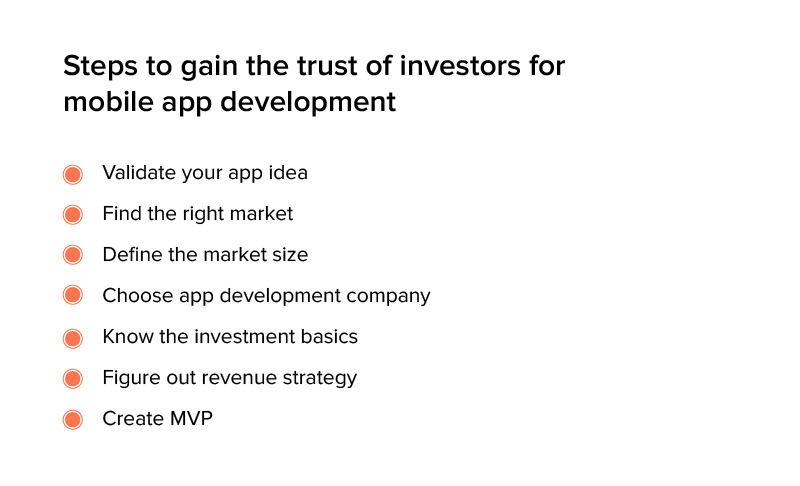How to get investors for your mobile app startups?
The market for mobile apps is lucrative, and everyone with an innovative app idea wants a piece. But hold on, is an idea merely enough? Well, NO! If you want to build a highly scalable and unique mobile app, you need significant funds. Market research, product development, marketing activities, and other stages of app development require financial investments.
But getting fundings for your app is surely not a cakewalk. Hence, you need to find investors for your business. Well, before you pitch your business idea or app concept to investors, make sure to conduct some preliminary research. If your idea looks revolutionary to investors, they’ll surely invest.
However, apart from the idea, if you present an MVP with minimal features, it will help investors to check and use your product in real-time. Investors will see that you are serious about your product and hence, they will be more likely to invest in it.
In one of his essays, Paul Graham wrote: “Most app investors decide in the first few minutes whether you seem like a winner or a loser, and once their opinion is set it’s hard to change. Every startup has reasons both to invest and not to invest. If app investors think you’re a winner they focus on the former, and if not they focus on the latter.’’
Thus, the first impression is really important to convince an investor. So, moving forward, let’s discuss the steps to gain the trust of your investors and the types of investors that you may find.
Types of investors

The market offers a variety of ways to get funded. Depending on your app idea, the amount of funds you need, and the stage you are at, you’ll need to look for investors in different places and pitch your ideas in different ways.
So, without further ado, let’s dive into the different types of investors you may find.
1. Family and friends: Family and friends are usually the easiest to convince that your app idea is worthy. However, in most cases, your personal connections can sponsor a startup only at the beginning. You can use that money to do market research and build a prototype to show other possible investors. To do more, you need to consider other options as well.
2. Co-founders: The second way is to invite your friends or family members to become a co-founder. When a person is convinced that your idea has enough potential, they are likely to invest in your project. You can also find people outside your connection to co-found your business if you have enough trust in them.
3. App contests: There are several app contests that take place in different parts of the world. While extremely competitive, these app contests give entrepreneurs a chance to present their idea to investors and convince them to finance your project.
4. Crowdfunding: It is a type of fundraising where collaborative efforts are made via the internet and other networks to raise money. For a successful crowdfunding campaign, you will need to invest time, effort, and probably money in marketing.
5. Angel investors and venture capitalists: In case you are looking for a serious infusion of money into your mobile startup, it’s angel investors and venture capitalists you should look for. These entities generally offer a large sum of money.
While angel investors for app development are more often individuals, venture capitalists are usually companies. In order for investors to take interest in your app, you have to make a very compelling argument to prove why your idea is worth the investment.
[Also Read: How to raise money for mobile app startup?]
Steps to gain the trust of investors for mobile app development

Having just a baseline app idea won’t help as investors want to know that you have really given this idea some thought. They want to see that you have analyzed your competitors and your product has the potential to succeed in the market.
Below are the key steps that will help gain the trust of investors and raise funds for your creative idea:
1. Validate your idea: Finding a good idea can be a daunting task. You need to brainstorm ideas that can make a difference and solve customers’ pain points. You can start by working on your area of interest or passion. Once you have an interesting app idea, the next step is to validate your app idea to make sure that it is promising. Investors don’t want to fund an app idea that already exists.
So, do a thorough research of the market and figure out the competitive landscape of your app’s market. Make sure that your app idea is not just a copy of another company’s offering. You can also consult an app development agency to understand the feasibility of your idea.
Find the right market: It’s important to understand the competitive landscape of the market. You need to do thorough research on applications in your space to find out what innovative features are they offering to users and how you can stay ahead of them.
2. Define the market size: When studying the competitive environment, you will get an idea regarding the size of the market you can expect. You must define the target audience and the market share, so that you can present your potential mobile app stakeholders with the real figures of the probable opportunities and risks, which can be expected.
Choose a reliable app development partner: Hiring a reliable app development partner can help turn your idea into reality. Choose a company that has successfully carried out similar projects and delivered analogous products.
A mobile app development company has a team of expert developers, UI/UX designers, and market specialists that offer competent suggestions and always take your vision into account.
The company also provides the latest industry expertise and access to the newest technologies. It helps create an app with the latest features and functionalities that will definitely impress investors. So, joining hands with a reputed development partner is the right thing to do if you want your product to get app funding from investors.
3. Know the investment basics: To gain the trust of your potential investors and be persuasive, you should know the basics of running a startup and money-raising yourself. This will help you understand the type of capital to take and the investment stages existing.
4. Figure out revenue strategy: Apart from understanding the basics of investment, you should also work on the strategy to generate revenue. The plain and clear strategy presented to the investors will make them finance your mobile app development more wholeheartedly. So, it’s essential to study the various monetization strategies and be ready to answer the clarification questions about them.
5. Create MVP: Minimum Viable Product or MVP is the first version of a product with a basic set of features. It is an effective and affordable way of helping investors understand the working flow of your app. An MVP allows you to understand if your app has the potential to succeed before going to mobile app investors.
Moreover, MVP provides your potential investors with a physical product that they can see and use in real-time. An investor loves nothing more than a business that already works and whose owners have invested time and their own money into it.
An MVP offers enormous flexibility so you are able to continue tweaking until you receive the ideal response. For a successful MVP development, you can contact us. Our team of experts will help create an MVP that will look favorable to mobile app investors.
We recently helped JobGet to create an application that makes the job search process easier for blue-collar workers. From understanding the client’s vision to MVP development, our team of experts helped them to raise funds for their unique application. JobGet has bagged $2.1 million funding to date and more than 1,50,000 job seekers have been placed.
What are the stages of mobile app funding?
Now that we have seen how to get investors for an app, let’s discuss the various stages of app funding.
1. Pre-seed: Pre-seed is the stage when your app is just a floating idea and nothing substantial has been done yet. This stage is considered an informal round because most funding comes from friends and family or it’s your own money. Funds raised in this stage are typically used to create a founding team, demos, or MVP, conduct research and collect data, and gain some early traction.
2. Seed stage: It is the second stage of funding where the focus is on the initial growth of your business. In the seed round, your mobile app startup is not yet operational, and you’re still working on improving the product. You’re looking for investments to fund further research, begin testing the product-market fit, and hire a workforce. At this stage, typically angel investors, early-stage venture capitalists, and startup incubators respond.
3. Series A: Reaching this stage of investment means you are on your way to success. At this point, you’ve established the market-product compatibility and have clearly defined the objective of your brand. You start to focus on your business and product growth. Your main focus should be on optimizing your business, marketability, and scalability of your mobile app. At this stage, venture capital firms, “super” angel investors, and family offices are the usual Series-A investors.
4. Series B,C,D, etc: Making to series B and beyond means your product has gained acceptance from users. This stage focuses on improving and adding new features to your product to attract more users. Your brand has a reputation and people are aware of your services. Now you have to take your app from a mobile app startup funding stage to a mid-size business. Funds raised at this stage are used for business acquisitions, going public, partnerships, upgrading branding levels, and engaging with new markets with constant product development and upgradation.
Now that we have seen how to get funding for an app, let’s see how much funding one needs for an app startup.
[Also Read: What type of mobile apps will tech investors fund in 2022?]
How much funding do you need for your app startup?
When it comes to how much funding for app startup is required, there isn’t any fixed figure to achieve. The exact number will depend on your app idea, the complexity of the app, the team, and other factors. For instance, a simple MVP with minimal features can cost anywhere from $15,000 to $50,000. A more complex cross-platform app with APIs, on the other hand, can cost anywhere between $50,000 to $200,000.
But don’t worry, we have already discussed the options to raise money for your startup. However, before going to the app investors, work with your full-cycle app development company to figure out the estimated cost of developing your app, functionalities, and primary purpose of the app. Without any budgetary plans in place, you risk making a monetary miscalculation that can cost you your dream.
If you receive less funding, you won’t be able to even start the app development process. On the other hand, if you receive more funds than you need, you may end up giving away your owner’s share or even your company to mobile app investors.
What to do once your app gets funding?
Once you’ve received funds from investors, what’s next? Well, your work doesn’t stop here. Your app needs continuous improvement and maintenance. Once your app is launched, keep improving your app and take feedback from users and app investors as you grow. As you move through the various stages of funding, your business will receive funds that can be used to add innovative features to the app, improve the design, and scale the business.
Plus, with the advent of new technologies and updates in OS, your app will surely need to evolve constantly. For this reason, you must hire a capable startup development app development company that can ensure the smooth functioning of your app for a long time.

strategies your digital product..




